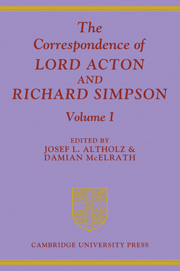Book contents
INTRODUCTION
Published online by Cambridge University Press: 31 March 2010
Summary
The Acton–Simpson correspondence possesses an interest which is both historical and biographical. Sir John (later Lord) Acton and Richard Simpson were the leading figures in the Liberal Catholic movement in England, a remarkable attempt to bridge the gap between the Roman Catholic Church and the secular principles of the nineteenth century. Their correspondence is the principal source for the history of this movement as well as a basic source for the biographies of these two men, each of whom was, in his way, an important figure in the religious and intellectual history of the age.
Acton (1834–1902), cosmopolitan in family and education, a born Catholic and a German-trained historian, was perhaps the most erudite man of his century, the ‘magistrate of history’ and a minor prophet of political theory. The lesser-known Simpson (1820–76), educated at Oxford, Anglican minister and Roman Catholic convert, was a congenial person with a reservoir of literary talent. In February 1858, these two men joined in a common literary endeavour, the Rambler, whose editorship Simpson had just assumed. The story of the Liberal Catholic movement in England is largely the story of their partnership in this magazine and its successor, the Home and Foreign Review, until the demise of the latter in 1864.
Beginning in enthusiasm, ending in defeat and disillusion, the story told by this correspondence epitomizes the history not merely of Liberal Catholicism but of many of the religious and intellectual movements of the nineteenth century.
- Type
- Chapter
- Information
- The Correspondence of Lord Acton and Richard Simpson , pp. vii - xxviPublisher: Cambridge University PressPrint publication year: 1971



